英语语法 情态动词及练习题
- 格式:doc
- 大小:46.50 KB
- 文档页数:5
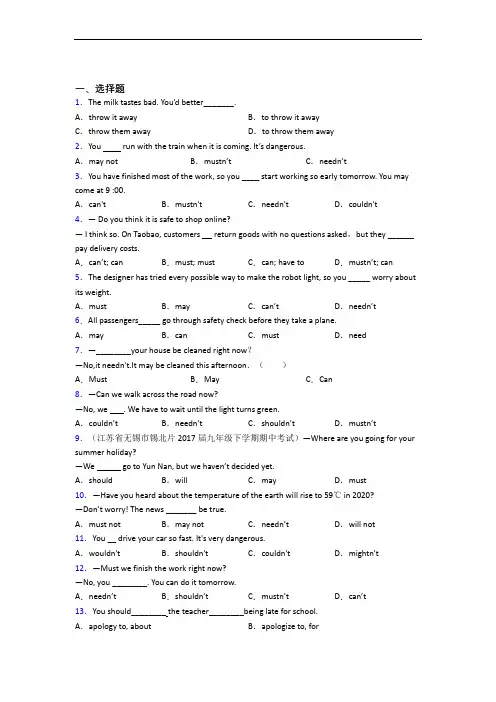
一、选择题1.The milk tastes bad. You’d better_______.A.throw it away B.to throw it awayC.throw them away D.to throw them away2.You run with the train when it is coming. It’s dangerous.A.may not B.mustn’t C.needn’t3.You have finished most of the work, so you ____ start working so early tomorrow. You may come at 9 :00.A.can't B.mustn't C.needn't D.couldn't4.— Do you think it is safe to shop online?— I think so. On Taobao, customers return goods with no questions asked,but they ______ pay delivery costs.A.can’t; can B.must; must C.can; have to D.mustn’t; can 5.The designer has tried every possible way to make the robot light, so you _____ worry about its weight.A.must B.may C.can’t D.needn’t6.All passengers_____ go through safety check before they take a plane.A.may B.can C.must D.need7.—________your house be cleaned right now?—No,it needn't.It may be cleaned this afternoon.()A.Must B.May C.Can8.—Can we walk across the road now?—No, we . We have to wait until the light turns green.A.couldn’t B.needn’t C.shouldn’t D.mustn’t9.(江苏省无锡市锡北片2017届九年级下学期期中考试)—Where are you going for your summer holiday?—We go to Yun Nan, but we haven’t decided yet.A.should B.will C.may D.must 10.—Have you heard about the temperature of the earth will rise to 59℃ in 2020?—Don’t worry! The news _______ be true.A.must not B.may not C.needn’t D.will not11.You __ drive your car so fast. It's very dangerous.A.wouldn't B.shouldn't C.couldn't D.mightn't 12.—Must we finish the work right now?—No, you ________. You can do it tomorrow.A.needn’t B.shouldn’t C.mustn’t D.can’t13.You should________ the teacher________being late for school.A.apology to, about B.apologize to, forC.apologies to, for D.apologize to, on14.-Could you help me with my English homework, Nancy?-Of course I____________. Glad to help.A.could B.can C.must D.do15.It is 11:00 p.m now. Peter hasn't come back yet. His mother ______ be very mad at him. A.may B.can C.must D.need16.— May I have some wine?— No, you . You have to drive home later.A.shouldn't B.needn't C.mustn't D.may not17.The flowers ________ every day, or they will die.A.must water B.can be wateredC.should water D.must be watered18.-_________ you help me with my homework?-Of course if I __________.A.Could; could B.Can't; can C.Could; can D.Can; could 19.—Mum, I’ve signed for a big box by Future Express (快递). What’s in it?—I’m not sure. It ________be a present from your brother.A.need B.must C.may D.will20.—Must I hand in my reports today?—No, you ________.A.mustn’t B.can’t C.shouldn’t D.don’t have to 21.—Could I call you by the first name?—Yes, you .A.will B.could C.may D.might 22.—Tom, we’re going shopping at eight, right?—Yeah, but I ______ be a little late, so don’t wait f or me.A.may B.should C.mustn’t【参考答案】***试卷处理标记,请不要删除一、选择题1.A解析:A【解析】【详解】句意:牛奶味道不好。
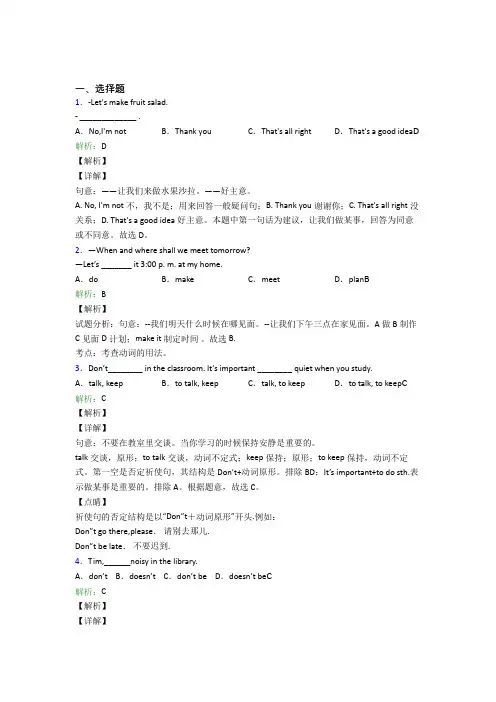
一、选择题1.-Let's make fruit salad.- _____________ .A.No,I'm not B.Thank you C.That's all right D.That's a good idea D 解析:D【解析】【详解】句意:——让我们来做水果沙拉。
——好主意。
A. No, I'm not不,我不是;用来回答一般疑问句;B. Thank you谢谢你;C. That's all right没关系;D. That's a good idea好主意。
本题中第一句话为建议,让我们做某事,回答为同意或不同意。
故选D。
2.—When and where shall we meet tomorrow?—Let’s _______ it 3:00 p. m. at my home.A.do B.make C.meet D.plan B解析:B【解析】试题分析:句意:--我们明天什么时候在哪见面。
--让我们下午三点在家见面。
A做 B制作C见面 D计划;make it 制定时间。
故选B.考点:考查动词的用法。
3.Don’t________ in the classroom. It’s important ________ quiet when you study. A.talk, keep B.to talk, keep C.talk, to keep D.to talk, to keep C解析:C【解析】【详解】句意:不要在教室里交谈。
当你学习的时候保持安静是重要的。
talk交谈,原形;to talk交谈,动词不定式;keep保持;原形;to keep保持,动词不定式。
第一空是否定祈使句,其结构是Don’t+动词原形。
排除BD;It’s important+to do sth.表示做某事是重要的。
排除A。
根据题意,故选C。
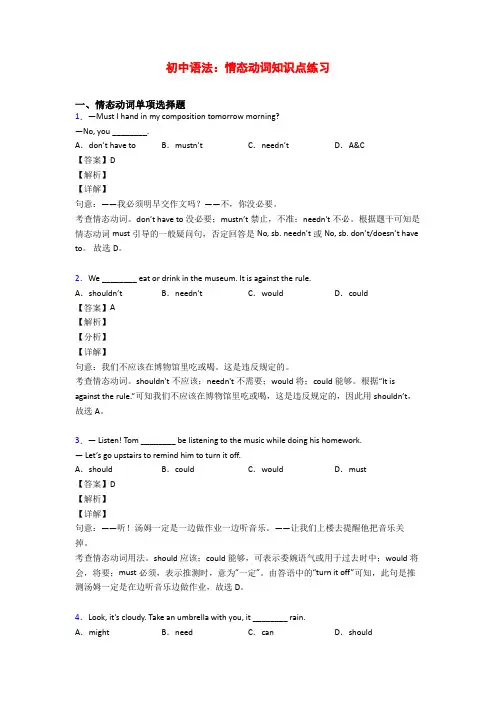
初中语法:情态动词知识点练习一、情态动词单项选择题1.—Must I hand in my composition tomorrow morning?—No, you ________.A.don’t have to B.mustn’t C.needn’t D.A&C【答案】D【解析】【详解】句意:——我必须明早交作文吗?——不,你没必要。
考查情态动词。
don’t have to没必要;mustn’t禁止,不准;needn't不必。
根据题干可知是情态动词must引导的一般疑问句,否定回答是No, sb. needn’t或No, sb. don’t/doesn’t have to。
故选D。
2.We ________ eat or drink in the museum. It is against the rule.A.shouldn’t B.needn’t C.would D.could【答案】A【解析】【分析】【详解】句意:我们不应该在博物馆里吃或喝。
这是违反规定的。
考查情态动词。
shouldn't不应该;needn't不需要;would将;could能够。
根据“I t is against the rule.”可知我们不应该在博物馆里吃或喝,这是违反规定的,因此用shouldn’t,故选A。
3.— Listen! Tom ________ be listening to the music while doing his homework.—Let’s go upstairs to remind him to turn it off.A.should B.could C.would D.must【答案】D【解析】【详解】句意:——听!汤姆一定是一边做作业一边听音乐。
——让我们上楼去提醒他把音乐关掉。
考查情态动词用法。
should应该;could能够,可表示委婉语气或用于过去时中;would将会,将要;must必须,表示推测时,意为“一定”。
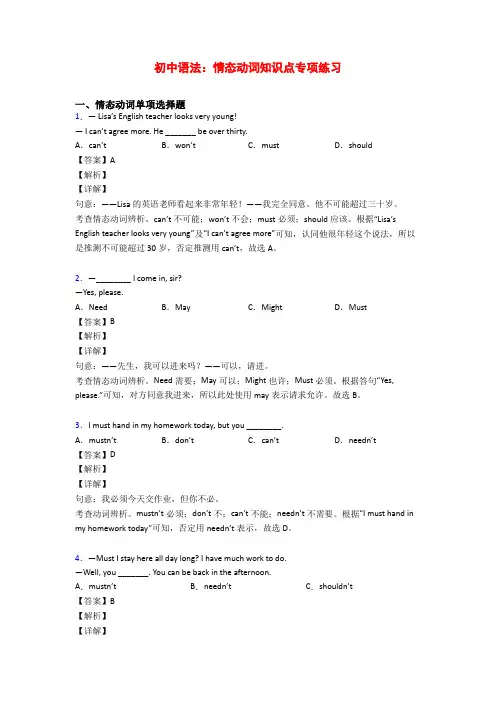
初中语法:情态动词知识点专项练习一、情态动词单项选择题1.—Lisa’s English teacher looks very young!—I can’t agree more. He _______ be over thirty.A.can’t B.won’t C.must D.should【答案】A【解析】【详解】句意:——Lisa的英语老师看起来非常年轻!——我完全同意。
他不可能超过三十岁。
考查情态动词辨析。
can’t不可能;won’t不会;must必须;should应该。
根据“Lisa’s English teacher looks very young”及“I can’t agree more”可知,认同他很年轻这个说法,所以是推测不可能超过30岁,否定推测用can’t,故选A。
2.—________ I come in, sir?—Yes, please.A.Need B.May C.Might D.Must【答案】B【解析】【详解】句意:——先生,我可以进来吗?——可以,请进。
考查情态动词辨析。
Need需要;May可以;Might也许;Must必须。
根据答句“Yes, please.”可知,对方同意我进来,所以此处使用may表示请求允许。
故选B。
3.I must hand in my homework today, but you ________.A.mustn’t B.don’t C.can’t D.needn’t【答案】D【解析】【详解】句意:我必须今天交作业,但你不必。
考查动词辨析。
mustn’t必须;don’t不;can’t不能;needn’t不需要。
根据“I must hand in my homework today”可知,否定用needn’t表示,故选D。
4.—Must I stay here all day long? I have much work to do.—Well, you _______. You can be back in the afternoon.A.mustn’t B.needn’t C.shouldn’t【答案】B【解析】【详解】句意:——我必须整天待在这儿吗?我有很多工作要做。
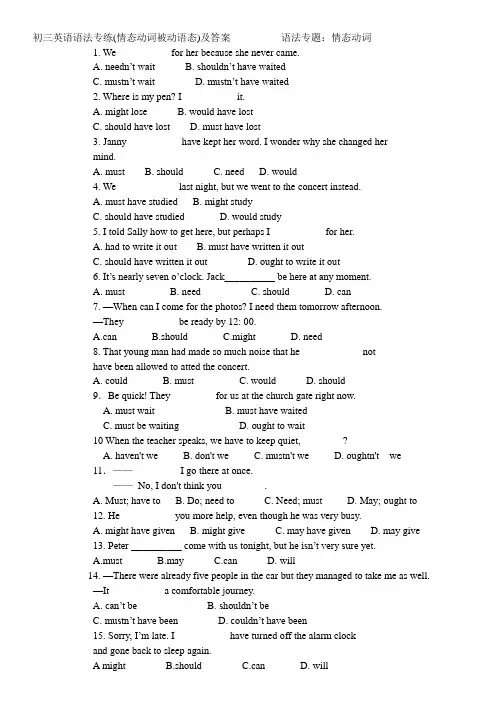
初三英语语法专练(情态动词被动语态)及答案语法专题:情态动词1. We __________ for her because she never came.A. needn’t waitB. shouldn’t have waitedC. mustn’t waitD. mustn’t have waited2. Where is my pen? I __________ it.A. might loseB. would have lostC. should have lostD. must have lost3. Janny __________ have kept her word. I wonder why she changed hermind.A. mustB. shouldC. needD. would4. We __________ last night, but we went to the concert instead.A. must have studiedB. might studyC. should have studiedD. would study5. I told Sally how to get here, but perhaps I __________ for her.A. had to write it outB. must have written it outC. should have written it outD. ought to write it out6. It’s nearly seven o’clock. Jack__________ be here at any moment.A. mustB. needC. shouldD. can7. —When can I come for the photos? I need them tomorrow afternoon.—They __________ be ready by 12: 00.A.canB.shouldC.mightD. need8. That young man had made so much noise that he __________ nothave been allowed to atted the concert.A. couldB. mustC. wouldD. should9.Be quick! They ________ for us at the church gate right now.A. must waitB. must have waitedC. must be waitingD. ought to wait10 When the teacher speaks, we have to keep quiet, ________?A. haven't weB. don't weC. mustn't weD. oughtn't we11.——________ I go there at once.——No, I don't think you ________.A. Must; have toB. Do; need toC. Need; mustD. May; ought to12. He __________ you more help, even though he was very busy.A. might have givenB. might giveC. may have givenD. may give13. Peter __________ come with us tonight, but he isn’t very sure yet.A.mustB.mayC.canD. will14. —There were already five people in the car but they managed to take me as well.—It __________ a comfortable journey.A. can’t beB. shouldn’t beC. mustn’t have beenD. couldn’t have been15. Sorry, I’m late. I __________ have turned off the alarm clockand gone back to sleep again.A might B.should C.can D. will16. Susan __________ written a report like this.A. can haveB. mustn’t haveC. can’t haveD. ought to not have17. You __________ walk for miles and miles among the hills withoutmeeting people.A. mustB. mayC. need D shoudⅤ.同步语法专项练习(被动语态)1.Do let your mother know the truth.She appears________everything.A.to tell B.to be told C.to be telling D.to have been told2.Visitors________not to touch the exhibits(展品).A.will request B.request C.are requesting D.are requested3.Mr.Lopes was much disappointed(失望)to find the bike he hadhad________wentwrong again.A.it repaired B.repaired C.repaired it D.to be repaired4.—Why did you come by taxi?—My bike broke down last night and I ________it repaired.A.didn't have B.don't have C.won't have D.haven't had5.Your clothes need________.________she wash them for you?A.to be washed;Shall B.to wash;Shall C.washing;Will D.being washed;Will 6.This kind of cloth________well.A.wash B.is washed C.washes D.washing7.—What do you think of the speech?—The speaker said almost nothing worth________.A.listening B.being listened to C.listening to D.being listening8.Bob,quickly get this film________.I want to know if this cameraworks well.A.washed B.developed C.printed D.shown9.He firmly asked________a chance to try his luck,which at onceencouraged(鼓励)_______.A.to give;the others four B.to be given;the other fourC.be given;four the other D.giving;the four others10.—I'd like a pen which ________well.—Will this one________?A.writes;do B.writes;work C.is written;do D.is written;work 11.To my disappointment,the computer I had________was out of orderagain.A.repaired B.repaired it C.had repaired it D.had repaired12.He________when the bus came to a sudden(突然)stop.A.was almost hurt B.was to hurt himselfC.was hurt himself D.was hurting himself13.The Bunsen Burner is so named because it is thought________byRobert Bunsen.A.to be invented B.having been inventedC.invented D.to have been invented14.I don't care if a hunting dog smells________,but we really don'twant him tosmell________.A.well;well B.bad;bad C.well;badly D.bad;badly15.All the preparations(准备)for the project________,and we're readyto start.A.completed(完成)B.had been completedC.complete D.have been completed16.—I________to a party,but I've got nothing to wear.—Why don't you have a dress made for the party?A.was asked B.will ask C.have asked D.have been asked17.Your room requires________.________she clean it for you?A.cleaning;Will B.to clean;ShouldC.to be cleaned;Shall D.being cleaned;Will18.I feel it is your husband who________for the spoiled child.A.is to blame B.is going to blameC.is to be blamed D.should blame19.—What's the matter?—The shoes don't fit properly.They________my feet.A.are hurt B.will hurt C.have hurt D.are hurting20.This kind of cloth________well and________long.A.is washed;lasts B.washes;lastsC.washes;is lasted D.is washed;lasted参考答案情态动词1. B 表示“本不应该做的事”。
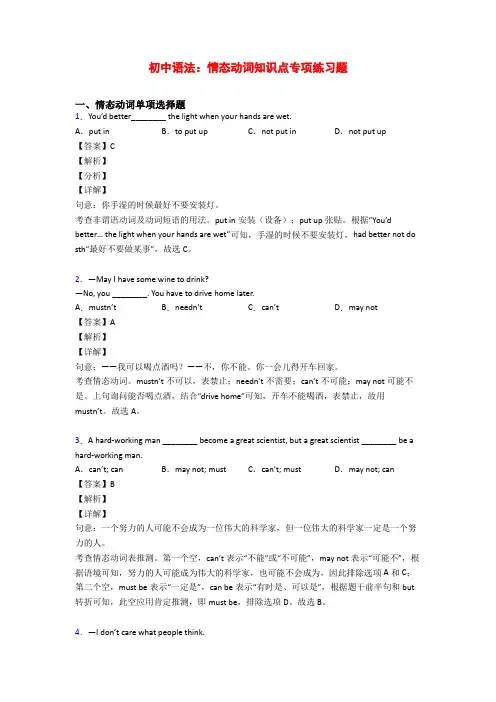
初中语法:情态动词知识点专项练习题一、情态动词单项选择题1.You’d better________ the light when your hands are wet.A.put in B.to put up C.not put in D.not put up【答案】C【解析】【分析】【详解】句意:你手湿的时候最好不要安装灯。
考查非谓语动词及动词短语的用法。
put in安装(设备);put up张贴。
根据“You’d better… the light when your hands are wet”可知,手湿的时候不要安装灯,had better not do sth“最好不要做某事”,故选C。
2.—May I have some wine to drink?—No, you ________. You have to drive home later.A.mustn’t B.needn’t C.can’t D.may not【答案】A【解析】【详解】句意:——我可以喝点酒吗?——不,你不能。
你一会儿得开车回家。
考查情态动词。
mustn’t不可以,表禁止;needn’t不需要;can’t不可能;may not可能不是。
上句询问能否喝点酒,结合“drive home”可知,开车不能喝酒,表禁止,故用mustn’t。
故选A。
3.A hard-working man ________ become a great scientist, but a great scientist ________ be a hard-working man.A.can’t; can B.may not; must C.can’t; must D.may not; can【答案】B【解析】【详解】句意:一个努力的人可能不会成为一位伟大的科学家,但一位伟大的科学家一定是一个努力的人。
考查情态动词表推测。
第一个空,can’t表示“不能”或“不可能”,may not表示“可能不”,根据语境可知,努力的人可能成为伟大的科学家,也可能不会成为,因此排除选项A和C;第二个空,must be表示“一定是”,can be表示“有时是、可以是”,根据题干前半句和but 转折可知,此空应用肯定推测,即must be,排除选项D。
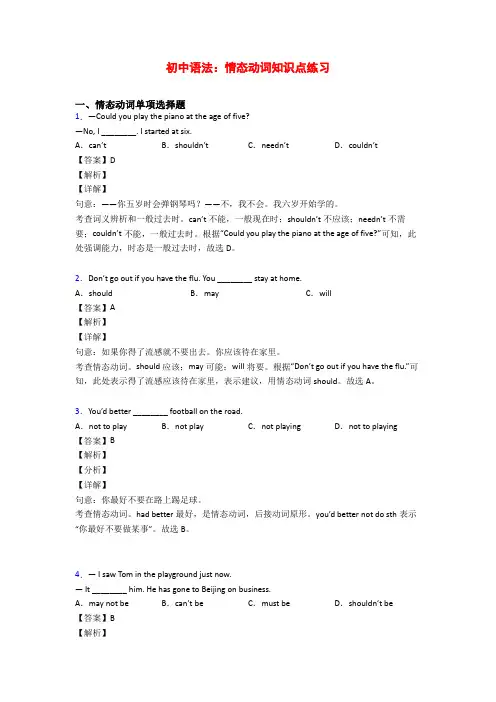
初中语法:情态动词知识点练习一、情态动词单项选择题1.—Could you play the piano at the age of five?—No, I ________. I started at six.A.can’t B.shouldn’t C.needn’t D.couldn’t【答案】D【解析】【详解】句意:——你五岁时会弹钢琴吗?——不,我不会。
我六岁开始学的。
考查词义辨析和一般过去时。
can’t不能,一般现在时;shouldn’t不应该;needn’t不需要;coul dn’t不能,一般过去时。
根据“Could you play the piano at the age of five?”可知,此处强调能力,时态是一般过去时,故选D。
2.Don’t go out if you have the flu. You ________ stay at home.A.should B.may C.will【答案】A【解析】【详解】句意:如果你得了流感就不要出去。
你应该待在家里。
考查情态动词。
should应该;may可能;will将要。
根据“Don’t go out if you have the flu.”可知,此处表示得了流感应该待在家里,表示建议,用情态动词should。
故选A。
3.You’d better ________ football on the road.A.not to play B.not play C.not playing D.not to playing【答案】B【解析】【分析】【详解】句意:你最好不要在路上踢足球。
考查情态动词。
had better最好,是情态动词,后接动词原形。
you’d better not do s th表示“你最好不要做某事”。
故选B。
4.— I saw Tom in the playground just now.— It ________ him. He has gone to Beijing on business.A.may not be B.can’t be C.must be D.shouldn’t be【答案】B【解析】句意:——我刚才看见汤姆在操场上。
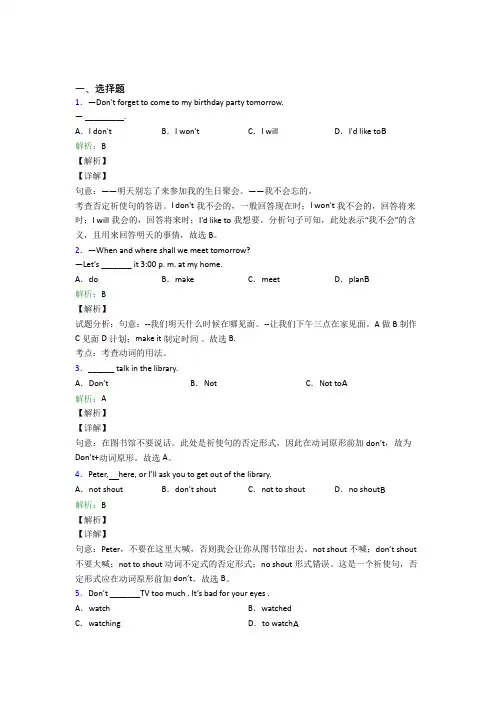
一、选择题1.—Don't forget to come to my birthday party tomorrow.— _________.A.I don't B.I won't C.I will D.I'd like to B解析:B【解析】【详解】句意:——明天别忘了来参加我的生日聚会。
——我不会忘的。
考查否定祈使句的答语。
I don't我不会的,一般回答现在时;I won't我不会的,回答将来时;I will我会的,回答将来时;I'd like to我想要。
分析句子可知,此处表示“我不会”的含义,且用来回答明天的事情,故选B。
2.—When and where shall we meet tomorrow?—Let’s _______ it 3:00 p. m. at my home.A.do B.make C.meet D.plan B解析:B【解析】试题分析:句意:--我们明天什么时候在哪见面。
--让我们下午三点在家见面。
A做 B制作C见面 D计划;make it 制定时间。
故选B.考点:考查动词的用法。
3.______ talk in the library.A.Don’t B.Not C.Not to A解析:A【解析】【详解】句意:在图书馆不要说话。
此处是祈使句的否定形式,因此在动词原形前加don’t,故为Don’t+动词原形。
故选A。
4.Peter, here, or I’ll ask you to get out of the library.A.not shout B.don’t shout C.not to shout D.no shout B解析:B【解析】【详解】句意:Peter,不要在这里大喊,否则我会让你从图书馆出去。
not shout不喊;don’t shout 不要大喊;not to shout动词不定式的否定形式;no shout形式错误。
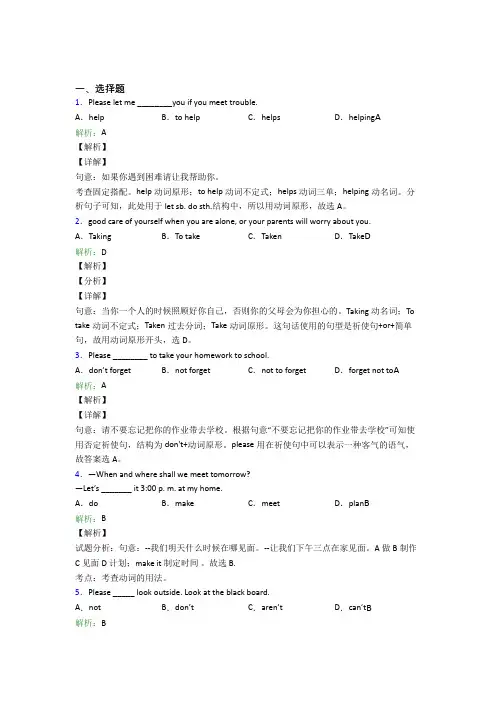
一、选择题1.Please let me ________you if you meet trouble.A.help B.to help C.helps D.helping A解析:A【解析】【详解】句意:如果你遇到困难请让我帮助你。
考查固定搭配。
help动词原形;to help动词不定式;helps动词三单;helping动名词。
分析句子可知,此处用于let sb. do sth.结构中,所以用动词原形,故选A。
2.good care of yourself when you are alone, or your parents will worry about you. A.Taking B.To take C.Taken D.Take D解析:D【解析】【分析】【详解】句意:当你一个人的时候照顾好你自己,否则你的父母会为你担心的。
Taking动名词;To take动词不定式;Taken过去分词;Take动词原形。
这句话使用的句型是祈使句+or+简单句,故用动词原形开头,选D。
3.Please ________ to take your homework to school.A.don’t forget B.not forget C.not to forget D.forget not to A解析:A【解析】【详解】句意:请不要忘记把你的作业带去学校。
根据句意“不要忘记把你的作业带去学校”可知使用否定祈使句,结构为don't+动词原形。
please用在祈使句中可以表示一种客气的语气,故答案选A。
4.—When and where shall we meet tomorrow?—Let’s _______ it 3:00 p. m. at my home.A.do B.make C.meet D.plan B解析:B【解析】试题分析:句意:--我们明天什么时候在哪见面。
--让我们下午三点在家见面。
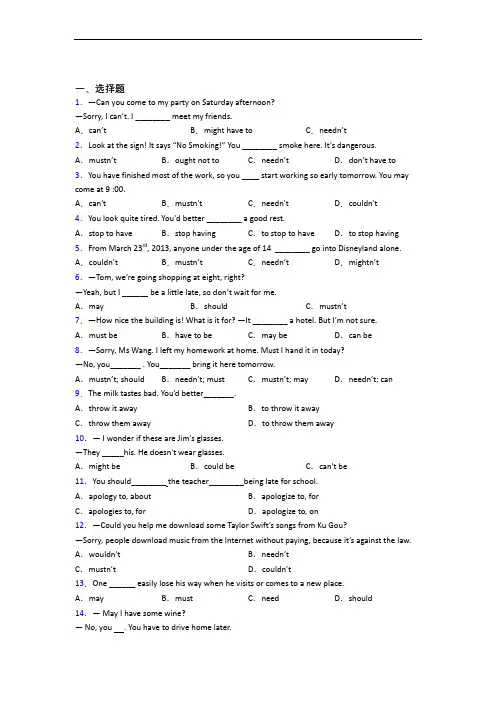
一、选择题 1.—Can you come to my party on Saturday afternoon? —Sorry, I can’t. I ________ meet my friends. A.can’t B.might have to C.needn’t 2.Look at the sign! It says “No Smoking!” You ________ smoke here. It’s dangerous. A.mustn’t B.ought not to C.needn’t D.don’t have to 3.You have finished most of the work, so you ____ start working so early tomorrow. You may come at 9 :00. A.can't B.mustn't C.needn't D.couldn't 4.You look quite tired. You'd better ________ a good rest. A.stop to have B.stop having C.to stop to have D.to stop having 5.From March 23rd, 2013, anyone under the age of 14 ________ go into Disneyland alone. A.couldn’t B.mustn’t C.needn’t D.mightn’t 6.—Tom, we’re going shopping at eight, right? —Yeah, but I ______ be a little late, so don’t wait for me. A.may B.should C.mustn’t 7.—How nice the building is! What is it for? —It ________ a hotel. But I’m not sure. A.must be B.have to be C.may be D.can be 8.—Sorry, Ms Wang. I left my homework at home. Must I hand it in today? —No, you_______ . You_______ bring it here tomorrow. A.mustn’t; should B.needn’t; must C.mustn’t; may D.needn’t; can 9.The milk tastes bad. You’d better_______. A.throw it away B.to throw it away C.throw them away D.to throw them away 10.— I wonder if these are Jim's glasses. —They _____his. He doesn't wear glasses. A.might be B.could be C.can't be 11.You should________ the teacher________being late for school. A.apology to, about B.apologize to, for C.apologies to, for D.apologize to, on 12.—Could you help me download some Taylor Swift’s songs from Ku Gou? —Sorry, people download music from the Internet without paying, because it’s against the law. A.wouldn’t B.needn’t C.mustn’t D.couldn’t 13.One ______ easily lose his way when he visits or comes to a new place. A.may B.must C.need D.should 14.— May I have some wine? — No, you . You have to drive home later. A.shouldn't B.needn't C.mustn't D.may not 15.—Could you please hang out with me this afternoon? —______. I have to make a plan for Clean-Up Day. A.Sorry, I couldn’t B.Sorry, I can’t C.Sure, I can D.Sure, I could 16.—Must I go out to have dinner with you, Mum? —No, you , my dear. You’re free to make your own decision. A.shouldn’t B.mustn’t C.needn’t D.can’t 17.—I feel tired. —You ________ go to bed so late. A.must B.shouldn’t C.should 18.(2017·甘肃白银·10)—I wonder if these are Danny's glasses. —They________be Danny's. He doesn't wear glasses. A.can't B.must C.mustn't D.can 19.The flowers ________ every day, or they will die. A.must water B.can be watered C.should water D.must be watered 20.Everyone______ be polite to their parents. A.could B.may C.should D.can 21.Will you please________them________the Birdwatching Society? A.inviting; join B.to invite; to join C.invite; to join D.to invite; join 22.— I would like________ to see a movie. — It’s too late. You’d better ________alone. A.to go, go B.go, not go C.to go, not go D.going, go
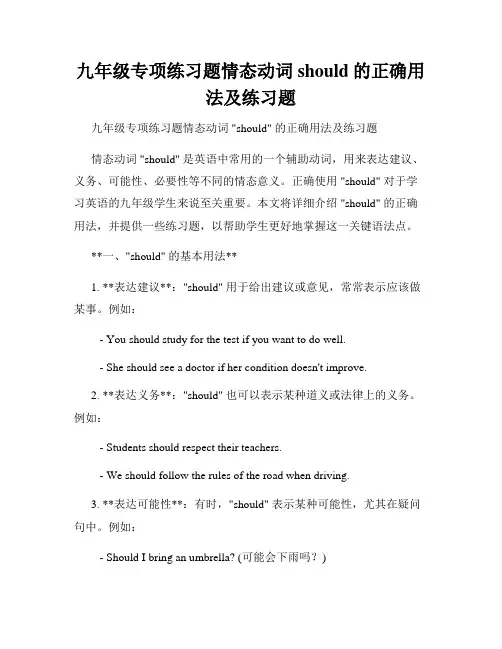
九年级专项练习题情态动词should的正确用法及练习题九年级专项练习题情态动词 "should" 的正确用法及练习题情态动词 "should" 是英语中常用的一个辅助动词,用来表达建议、义务、可能性、必要性等不同的情态意义。
正确使用 "should" 对于学习英语的九年级学生来说至关重要。
本文将详细介绍 "should" 的正确用法,并提供一些练习题,以帮助学生更好地掌握这一关键语法点。
**一、"should" 的基本用法**1. **表达建议**:"should" 用于给出建议或意见,常常表示应该做某事。
例如:- You should study for the test if you want to do well.- She should see a doctor if her condition doesn't improve.2. **表达义务**:"should" 也可以表示某种道义或法律上的义务。
例如:- Students should respect their teachers.- We should follow the rules of the road when driving.3. **表达可能性**:有时,"should" 表示某种可能性,尤其在疑问句中。
例如:- Should I bring an umbrella? (可能会下雨吗?)- Should we be concerned about the weather forecast?4. **表达必要性**:在某些情况下,"should" 可以表达必要性或适当性。
例如:- You should wear a helmet when riding a bike for safety.- I should clean my room before guests arrive.**二、常见错误用法**学生在使用 "should" 时常犯一些常见的错误,以下是一些需要避免的错误用法:1. **不必要使用 "should"**:有时学生会过度使用 "should",而使句子显得不自然。
一、选择题1.—Let’s __________ volleyball.— That __________ good.A.playing;sounds B.play;soundsC.play;sound D.plays;sound B解析:B【解析】【详解】句意:——我们去打排球吧。
——听起来很不错。
考查祈使句和动词第三人称单数形式。
第一个空格所在句子为let开头的祈使句,谓语动词应用原形,A、D选项可排除。
第二个空前面指示代词that表单数,故谓语应用第三人称单数形式,即sounds,故选B。
2.______ talk in the library.A.Don’t B.Not C.Not to A解析:A【解析】【详解】句意:在图书馆不要说话。
此处是祈使句的否定形式,因此在动词原形前加don’t,故为Don’t+动词原形。
故选A。
3.Do you want to be healthy? ___. Smiling can help you stay healthy.A.Smiles B.Smiling C.To smile D.Smile D解析:D【解析】【详解】句意:你想要健康吗?(那就)笑。
笑能帮你保持健康。
考查祈使句。
A. Smiles(一般现在时单三形式);B. Smiling(动名词);C. To smile(不定式);D. Smile(动词原形);判断答语是祈使句,祈使句以动词原形开头,故选D。
4.The teacher often says, “ _____ late for school. ”A.Don’t B.Don’t be C.Not D.Doesn’t B解析:B【解析】【详解】句意:老师经常说:“上学不要迟到。
”老师的话是一个祈使句,祈使句的主要动词要用原形,late是形容词,前要加be动词。
祈使句的否定,是在句首加don’t。
故选B。
5.---Be careful, don’t forget to follow your father.---I know that, Mum. One can never be too careful.A.and B.or C.but D.so A解析:A【解析】试题分析:and和,并且;or或者,否则;but但是;so因此。
一、选择题1.Don’t _______ about his English .He is studying hard at it.A.be worried B.be worry C.be worrying D.to worry A解析:A【解析】【详解】句意:不要担心他的英语。
他正在努力学习它。
考查动词短语。
A. be worried担忧、担心;B. be worry构不成任何形式,故错误;C.be worrying正担心;D. to worry动词不定式,担心。
根据句式可知,本句为祈使句的否定句,空处应为动词原形,故排除D;be worried about…表示对……担心,忧虑,故选A。
2.______ talk in the library.A.Don’t B.Not C.Not to A解析:A【解析】【详解】句意:在图书馆不要说话。
此处是祈使句的否定形式,因此在动词原形前加don’t,故为Don’t+动词原形。
故选A。
3.Peter, here, or I’ll ask you to get out of th e library.A.not shout B.don’t shout C.not to shout D.no shout B解析:B【解析】【详解】句意:Peter,不要在这里大喊,否则我会让你从图书馆出去。
not shout不喊;don’t shout 不要大喊;not to shout动词不定式的否定形式;no shout形式错误。
这是一个祈使句,否定形式应在动词原形前加don’t,故选B。
4.Mike, __________ make any noise, your father is sleeping.A.not B.don't C.won't D.can't B解析:B【解析】【详解】句意:麦克,不要吵闹,你父亲正在睡觉。
考查祈使句。
A. not 不,没有;B. don’t 不,没有;C. won’t 将不会;D. can’t 不能,不会。
一、选择题1.Get up early,______you’ll be late for school.A.so B.and C.or D.but C解析:C【解析】【分析】【详解】句意:早点起床,否则你会上学迟到。
考查祈使句+and/or+陈述句,祈使句相当于条件状语从句,后面陈述句表示的结果。
(1)“祈使句,+and + 陈述句”该句型表示如果做到了祈使句表示的事情,就会有后面句子表示的结果。
(2)祈使句,+ or + 陈述句该句型表示如果不做到祈使句表示的事情,就会有后面句子表示的结果。
根据句意及语境此题应选C。
2.good care of yourself when you are alone, or your parents will worry about you. A.Taking B.To take C.Taken D.Take D解析:D【解析】【分析】【详解】句意:当你一个人的时候照顾好你自己,否则你的父母会为你担心的。
Taking动名词;To take动词不定式;Taken过去分词;Take动词原形。
这句话使用的句型是祈使句+or+简单句,故用动词原形开头,选D。
3.— Please ________very quiet. They___________ .— OK, I will.A.to be; sleep B.be; are sleepingC.to be; are sleeping D.be; sleeps B解析:B【解析】【详解】句意:—请非常安静,他们正在睡觉。
—好的。
A. to be; sleep是,不定式;睡觉,一般现在时;B. be; are sleeping是,动词原形;正在睡觉,现在进行时;C. to be; are sleeping是,不定式;正在睡觉,现在进行时;D. be; sleeps是,动词原形;睡觉,一般现在时。
根据第1空,祈使句,please加动词原形,所以排除A和C。
情态动词的基本用法1.shall(1)用在第一、三人称的疑问句中,表示征求对方的意见。
►Shall Tom go there with me tomorrow?明天汤姆可以和我一起去那里吗?(2)用于第二、三人称陈述句中,表示说话人的命令、警告、威胁、许诺、决心等,意为“必须”。
►The school rules state that no child shall be allowed out of the school unless accompanied by an adult.学校制度规定,除非有成人陪同,任何孩子不准离开学校。
2.should(1)表示责任、义务、劝告、建议,意为“(按道理)应该”。
►You should listen to your doctor's advice.你应该听医生的建议。
(2)表示出乎意料的语气,意为“竟然,居然”。
►I am surprised that you should speak in such a way.我很惊讶你居然用那种口气说话。
3.must(1)表示“必须,应该”,语气强烈。
强调主观看法,只有现在时形式,否定式是must not(mustn't),表示“禁止”。
must开头的问句,其否定回答要用needn't或don't have to来表达。
►—Must I hand in the paper today?——我今天必须交作业吗?—Yes, you must.——是的,你必须交。
—No, you needn't/don't have to.——不,你不需要。
(2)表示推测,意为“一定”,用于肯定句。
►At 29 Russell must be one of the youngest ever international referees.29岁的拉塞尔想必是迄今为止最年轻的国际裁判之一。
初中语法:情态动词知识点专项练习题一、情态动词单项选择题1.—Lisa’s English teacher looks very young!—I can’t agree more. He _______ be over thirty.A.can’t B.won’t C.must D.should【答案】A【解析】【详解】句意:——Lisa的英语老师看起来非常年轻!——我完全同意。
他不可能超过三十岁。
考查情态动词辨析。
can’t不可能;won’t不会;must必须;should应该。
根据“Lisa’s English teacher looks very young”及“I can’t agree more”可知,认同他很年轻这个说法,所以是推测不可能超过30岁,否定推测用can’t,故选A。
2.—Is that red schoolbag Mary’s?—It ________ be hers. She hates that color.A.can’t B.may C.might D.mustn’t【答案】A【解析】【分析】【详解】句意:——那个红色书包是玛丽的吗?——不可能是她的。
她讨厌那种颜色。
考查情态动词。
can’t不能;may可以;might或许;mustn’t禁止。
根据“She hates that color.”判断,包不可能是玛丽的,表示否定的推测用can’t be。
故选A。
3.一Must I return this book tomorrow?—No, you __________. You can keep it until next week.A.can’t B.mustn’t C.needn’t D.shouldn’t【答案】C【解析】【分析】【详解】句意:——明天我必须还这本书吗?——不,你不必。
你可以借到下周。
考查情态动词。
can’t不可以;mustn’t禁止;needn’t不需要;shouldn’t不应该。
初中语法:情态动词知识点专项练习题一、情态动词单项选择题1.—Hi, Mary! I want to go to Qinghai Museum, but I am not sure ________ get there.—Don’t worry. Let me tell you.A.how could I B.how I can C.how can I D.how I did【答案】B【解析】【分析】【详解】句意:——嗨,玛丽!我想去青海博物馆,但我不知道怎么才能到那里。
——别担心。
我来告诉你。
考查宾语从句。
根据句意可知,空处是宾语从句,应用陈述语序,故排除A、C项;在宾语从句中,原形动词get之前应是情态动词can,而不是did,故排除D。
故选B。
2.The baby is sleeping. Would you please ________?A.turned the radio on B.turn the radio downC.turned the radio off D.turn the radio up【答案】B【解析】【详解】句意:宝宝在睡觉。
请你把收音机关小点声好吗?考查动词短语辨析和情态动词的用法。
turn on打开;turn down调小;turn off关闭;turn up调大。
Would是情态动词,其后加动词原形,排除AC;根据“The baby is sleeping.”可知,是调小音量,故选B。
3.—Must I stay here with you, Mum?— No, you ________. You may go home now, but you ________ go to the net-bar. A.mustn’t; needn’t B.needn’t; mustn’t C.must; need【答案】B【解析】【详解】句意:——妈妈,我必须和你待在这里吗?——不,不需要,你可以现在回家,但是你禁止去网吧。
1 情态动词 一、知识梳理/提炼 1. can和could的用法 表示能力或客观可能性,还可以表示请求和允许。如: Can you finish this work tonight? Man cannot live without air. — Can I go now? — Yes, you can. 注意:①could也可表示请求,语气委婉,主要用于疑问句,不可用于肯定句,答语应用can(即could不能用于现在时态的简略答语中)。如: Could I come to see you tomorrow? Yes, you can. (否定答语可用No, I'm afraid not.) ②can表示能力时,还可用be able to代替。如: I'll not be able to come this afternoon. 2. may和might的用法 1)表示许可。 表示请求、允许时,might比may的语气更委婉一些,否定回答时要用mustn't表示“不可以”、“禁止”、“阻止”之意。如: You may drive the car. — Might I use your pen? — No, you can’t/ mustn't. Yes, you can/may. 用May I ... 征询对方许可在文体上比较正式,在口气上比较客气。在日常口语中,用Can I ... 征询对方意见在现代口语中更为常见。 2) 用于祈使句中表示祝愿。如: 祝你成功! May you succeed! 3)表示推测、可能(疑问句不能用于此意)。 他现在可能很忙。 He may be very busy now. 3. must和have to的用法 1) 表示必须、必要。如: You must come in time. 回答must引出的问句时,如果是否定的回答,不能用mustn't,而要用needn't或don't have to。 — Must we hand in our exercise books today? — Yes, you must. No, you don’t have to/needn’t. 2) “must be + 表语”的结构表示对现在的推测,它的否定或疑问式用can代替must。 这肯定是你的笔吧。 This must be your pen. 3) have to的含义与must相似,两者往往可以互换使用,但have to有各种形式,随have的变化而定。must与have to有下列几点不同: ① must表示的是说话人的主观看法,而have to则往往强调客观需要。如: The play is not interesting. I really must go now. 我现在必须得走了 我在你这么大的时候必须得工作。 I had to work when I was your age. ② must一般只表现在,have to则有更多的时态形式。 ③ 二者的否定意义不大相同。如: You mustn't go. 你不准去。 You don't have to go. 你不必去。 2
4. need的用法 1) need表示“需要”或“必须 You needn’t come so early. — Need I finish the work today? — Yes, you must/have to/should/ought to. 2) need 也可以做实义动词,表示“需要”,人做主语时,为sb. need to do, 物做主语时为 sth. need doing 或 sth. need to be done.如: The garden needs watering/to be watered. I don't think you need to worry about this. 5. dare的用法 1)dare作情态动词时,主要用于疑问句、否定句和条件从句中,一般不用在肯定句中。如: How dare you say I'm unfair. He daren't speak English before such a crowd, dare he? 2)dare 可以做实义动词,敢;胆敢[+to-v],如: He did not dare to leave his car there. 6. shall和should的用法 1) shall用于第一、第三人称疑问句中,表示说话人征求对方的意见或向对方请示。如: Shall we begin our lesson? When shall he be able to leave the hospital? 2)shall用于第二、第三人称,表示说话人给对方命令、警告、允诺或威胁。如: You shall fail if you don't work harder. (警告) He shall have the book when I finish reading. (允诺) He shall be punished. (威胁) should的含义较多,用法较活,现介绍三种其特殊用法。请看下面的句子: ① I should think it would be better to try it again. 我倒是认为最好再试一试。 ② You are mistaken, I should say. 依我看,你是搞错了。 ③ I should advise you not to do that. 我倒是劝你别这样做。 ④ This is something I should have liked to ask you. 这是我本来想问你的。 从以上例句可以看出:情态动词should用于第一人称时可以表示说话人的一种谦逊、客气、委婉的语气。 should还可以用在if引导的条件从句,表示一件事听起来可能性很小,但也不是完全没有可能。相当于“万一”的意思。从句谓语should do,主句谓语却不一定用虚拟语气。如: ⑤ 你万一见到她,请让她给我打个电话。Ask her to ring me up if you should see her. ⑥如果你万一改变主意,请让我们知道。 If you should change your mind, please let us know. ⑦ Should I (If I should) be free tomorrow I will come. 此外,Why(or How) + should结构表示说话人对某事不能理解,感到意外、惊异等意思。意为“竟会”。如: ⑧你今天为何竟会来得这么晚?Why should you be so late today? ⑨ — where is Betty living? —我怎么知道? How should I know? ⑩我真不知道你凭什么认为这件事是我干的。I don't know why you should think that I did it. 7. will和would的用法 1)表示请求、建议等,would比will委婉客气。如: Would you pass me the book? 2)表示意志、愿望和决心。如: I will never do that again. They asked if we would do that again. 3)表料想或猜想。如: 3
It would be about ten when he left home. What would she be doing there? I thought he would have told you all about it. 8. ought to的用法 1)ought to表示应该。如: You ought to take care of him. He ought to be home by now. 9. used to,had better,would rather的用法 1)used to do过去常常做某事(现在已不做) 当他小的时候他常常5点钟就起床。He used to get up at 5 am when he was young. Be used to do 被用来做某事 be used to doing 习惯于做某事 2)had better do意为“最好做某事”,后接不带to的不定式。如: — We had better go now. — Yes, we had (we'd better / we had better). 3)would rather do意为“宁愿做某事”,表选择。如: 我宁愿现在什么也不说。 I'd rather not say anything. 你宁愿在农场工作吗? Would you rather work on a farm? 10.情态动词的现在完成式的用法 情态动词现在完成式主要有两个功能:表示已经发生的情况和表示虚拟语气。在这两个方面must / mustn’t; can / can’t ; need / needn’t; may / mayn’t; might / mightn’t; should / shouldn’t; ought等情态动词+完成式表示的意思是有一定区别的
表示已经发生的情况: 1)“must + have + 过去分词”的结构常用在肯定句中,表示过去肯定应经发生过某事。它的否定或疑问式用can代替must。如:他一定是去过上海。 He must have been to Shanghai. 2)may / might have +过去分词,表示对已发生的事情做不肯定、可能性很小的推测,译为“过去也许发生过某事”。如:他可能已经把真相告诉他妻子了。He might have told his wife the truth. 3)couldn’t have done, 过去不可能做过某事。 He couldn’t have done that. 4)could have done 过去可能做过某事。
表示虚拟语气 1) needn’t have + 过去分词,表示做了不必做的事,译为“本没必要做某事”。如: 你本来不需要等我的。You needn't have waited for me. 2)should have +过去分词,表示应该做某事但实际上未做,译为“本应该做某事”;should not + have过去分词表示本不应该做某事但实际上做了,译为“本不应该某事”。如: 我本来应该提前仔细地计划好一切的。I should have planned everything ahead carefully. 我本来不应该对他态度那么不好的。 I shouldn’t treated him so badly/ rudely. 2) would + have + 过去分词表示过去本来会...(但没发生),主要用于第二、三人称,表示对已经完成的动作或事态的推测。 如:截止到那时,宾客们本来应该到了。 The guests would have arrived by that time/by then. 4)could have done, 过去本可能做某事但未做。 我本来可以赢这个游戏的,但我后来决定让她赢。I could have won the game but decided to let her win. 5)couldn’t have done, 过去本不可能做成某事。 要是没有你的帮助,我是不可能成功的。 Without your help, I couldn’t have succeeded.